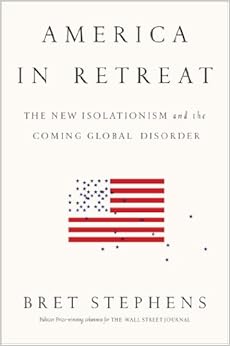“Little minds think great thoughts,” a wise man once wrote, “but great minds proceed in the smallest stages.” Oh wait, that wasn’t a wise man, that was me (in the novel The Uncanny) — but even a stopped clock is right twice a day.
Increasingly, I find myself noticing the fact that the very best thinkers and writers on the political right — who are the best thinkers and writers in the political sphere (it’s not even close) — get less immediate attention than the blusterers and bloviaters on both sides. Big Ideas that almost always turn out to be untrue, paranoia and hysteria sell books and bring in ratings, while close observation, fact gathering, skepticism and calm common sense tend to be less commercial. As a result, there’s a pressure on thinkers to start screaming “Fire!” at every new development. It’ll get you interviewed and help you peddle whatever your wares are. (On the left, of course, screaming “Fire!” is known as talking.)
Over time, however, cool, skeptical wisdom often does rise to the top. Charles Krauthammer is an excellent example. His recent book (which I’m reading now and which is lovely) eschews hysteria and self-certainty, but sold a bundle. PJM’s own Andrew C. McCarthy, who has become one of my go-to’s for sharp, informed but measured observation of the political scene, has been discovered by Megyn Kelley and will continue to gain readers.
And then there’s the increasingly remarkable Bret Stephens.
Stephens is the Pulitzer winning foreign policy columnist for the Wall Street Journal. His new book America in Retreat: The New Isolationism and the Coming Global Disorder is a wise, measured, hugely intelligent and vastly well informed look at where our foreign policy is and where it should go. (You will note the rather hysterical sub-title. The publisher slapped one of those on McCarthy’s last book too. They know where their bread is buttered, but once you get between the covers with the writer, things settle down.)
Stephens does not engage in anti-left name calling (anyone who wants to indulge in that low and degraded business can simply watch one of my videos!), he doesn’t demonize the current president, or his editorialist colleagues on the other side — he simply, quietly and factually vivisects them by quoting their words, outlining their actions and pointing to the results:
The evidence of where the Obama administration’s foreign policy has led is becoming difficult to ignore. Russia’s invasion of Ukraine; China’s aggressive maritime claims against Japan and the Philippines; Iran’s confident march to nuclear capability; North Korea’s nuclear tests; the unfolding chaos in Iraq; the calamity in Syria. Averting one’s eyes, keeping our hands clean, staying out, remaining in a supine position, is not a foreign policy option for the United States.
But as the title of the book suggests, Stephens believes that America is not in decline, it is merely in retreat. The nation’s reserves of innovation, liberty, wealth and power are enough to keep it on top of the world — he says for decades, I would say a century and more. But with that great power comes, you guessed it, great responsibility. And Stephens’s suggestions for how we might meet that responsibility are as sane and logical as any I’ve heard.
Stephens looks for inspiration to the Broken Windows policing that transformed American cities from the crime-infested hellholes of the ’70s to the safe metropolises the Obama administration is currently trying to remake into crime-infested hellholes. The Broken Windows theory — first written about in the Atlantic and championed by my pals at City Journal — is that keeping order in small things tends to prevent major crimes as well.
“Is there a broken-windows formula for U.S. foreign policy?” Stephens asks. “There could be.”
The immediate goal of U.S. foreign policy should be to arrest the continued slide into a broken-windows world of international disorder. The broken-windows theory emphasizes the need to put cops on the street, the more the better, creating a sense of presence, enforcing community norms… A broken-windows approach to geopolitics would not try to run every bad guy out of town — a utopian ambition. But it would seek to keep their ambitions sharply in check and make the world a more congenial place for peaceful and ordinary states.
Politicians are always saying, “America can’t be the world’s police,” but that’s because politicians are knuckleheads. Stephens knows the truth: We have to be the world’s police, we just can’t be its priest. “Priests are in the business of changing hearts and saving souls. Cops merely walk the beat, reassuring the good, deterring the tempted, punishing the wicked.”
This excellent book sets forward a workable plan for how that could be achieved.










Join the conversation as a VIP Member